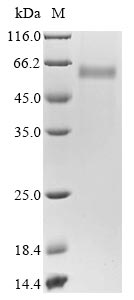Recombinant Bovine coronavirus Nucleoprotein (N) is produced in a mammalian cell expression system, which appears to ensure proper folding and post-translational modifications. The protein spans the complete sequence of 1-448 amino acids and includes a C-terminal 6xHis-tag for simplified purification and detection. Purity levels exceed 85% based on SDS-PAGE confirmation, making this product suitable for various research applications that require high-quality recombinant proteins.
The nucleoprotein of Bovine coronavirus likely plays a critical role in packaging and protecting viral RNA. It participates in forming the ribonucleoprotein complex, which appears essential for viral genome replication and transcription. This protein has become a key focus in research aimed at understanding coronavirus replication mechanisms and developing diagnostic tools.
Potential Applications
Note: The applications listed below are based on what we know about this protein's biological functions, published research, and experience from experts in the field. However, we haven't fully tested all of these applications ourselves yet. We'd recommend running some preliminary tests first to make sure they work for your specific research goals.
The protein is expressed in a mammalian cell system, which supports native-like folding and post-translational modifications (PTMs)—critical for the full-length bovine coronavirus nucleoprotein (N) to bind viral RNA and form nucleocapsids. Full-length expression (1–448 aa) preserves all functional domains, and the C-terminal 6xHis tag is minimally disruptive to structure. However, no direct evidence confirms native secondary/tertiary structure (e.g., circular dichroism for RNA-binding pocket geometry, thermal shift assays for stability) or retention of functional conformations. Mammalian expression improves folding likelihood but does not guarantee it. The protein's biological activity (e.g., RNA binding affinity, oligomerization, interaction with viral RNA-dependent RNA polymerase [RdRp]) is untested—while folding is probable, functional validation is required to confirm native-like behavior.
1. Antibody Development and Validation Studies
This full-length recombinant BCoV N protein can serve as an immunogen for generating monoclonal/polyclonal antibodies, and mammalian folding likely preserves conformational epitopes. However, antibody specificity must be validated against native N—the His tag may alter antigenicity, and antibodies may not recognize the fragment in its native context (e.g., on viral particles or infected cells). ELISA can screen for affinity, but validation with native protein or infected cells is critical.
2. Protein-Protein Interaction Studies
Pull-down assays using the His tag can identify cellular/viral interactors, but results depend on correct folding—misfolded N may yield false positives/negatives. Identified partners (e.g., RdRp or host factors) must be validated via co-IP or functional assays (e.g., replicon assays) to rule out artifacts. The full length supports domain-specific interaction mapping, but bioactivity (e.g., RNA binding) is unconfirmed.
3. Structural and Biochemical Characterization
This protein supports preliminary biophysical studies (e.g., CD for secondary structure, DLS for stability) and biochemical assays (e.g., thermal shift for stability). Mammalian expression suggests native-like folding, but the His tag may interfere with high-resolution techniques (e.g., crystallography)—tag cleavage (via protease) may improve results. RNA binding and nucleocapsid assembly must be validated experimentally.
4. Comparative Coronavirus Research
This mammalian-expressed N protein enables cross-species comparisons, but PTM differences (e.g., glycosylation) or folding variations may confound results—BCoV N may behave differently than N from SARS-CoV-2 or MERS-CoV. Evolutionary insights require complementary sequence/functional data to account for system biases.
Final Recommendation & Action Plan
This mammalian-expressed BCoV N protein is a strong candidate for antibody development and functional studies due to its native-like folding potential, but rigorous validation is essential first, confirm folding via circular dichroism/thermal shift assays to rule out misfolding; second, validate bioactivity (e.g., RNA binding, oligomerization) using co-IP or replicon assays; third, for comparative research, pair with full-length proteins from other coronaviruses to contextualize fragment results. Optimize expression (e.g., use glycoengineered cell lines) to enhance native-like PTMs. If folding/bioactivity fails, use a viral replication system to produce native protein—this N protein’s utility for mechanistic studies depends on validating its structural and functional integrity relative to the native virus.






